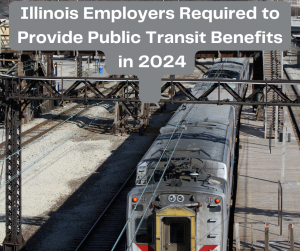Another wrinkle for employers in the Chicago area.
Businesses located in the six-county Chicago area near public transit routes operated by the Regional Transportation Authority (RTA) that have at least 50 employees will be required as of Jan. 1, 2024, to provide their full-time employees with pre-tax public transit benefits.
Signed on July 28, the Transportation Public Benefits Act impacts employers (an earlier version of the bill would have hit those with 25 or more employees) within 38 specific townships and counties—including all of Cook County—housed at addresses within one mile for an RTA fixed-route transit service. The benefit will be required once full-time employees (defined as working 35 hours or more) have been with their employers for at least 120 days.
Employees must be able to elect pre-tax salary reduction that go toward transit pass expense reimbursement, with “transit pass” defined as tokens, fare cards or vouchers that enable someone to access and use public transit un by the RTA or Chicago Transit Authority.
The act does not require employers to make contributions of their own toward these commuter benefits, although they may do so as stipulated by federal tax law. They can also provide reimbursement under federal law for vanpooling, parking and bicycling commuting expenses, although the act does not require any of these options.
The transit benefit is required to follow federal rules for qualified transportation fringe benefits in Internal Revenue Code Section 132(f), including the monthly maximum election amount, which has been $300 for 2023. The maximum amount for 2024 is TBD, and it’s impacted by annual cost-of-living adjustments, but it holds true whether the benefits are funded through employee salary reductions, employer contributions or some of each.
The Transportation Benefits Program Act puts Illinois in the company of six other U.S. jurisdiction that require employee transportation benefits in some form or fashion. The others are New York City, Los Angeles, Seattle, New Jersey, the San Francisco Bay Area, and Washington, D.C.
In addition to all of Cook County, the act covers employers in: Warren Township in Lake County, Grant Township in Lake County, Frankfort Township in Will County, Wheatland Township in Will County, Addison Township, Bloomingdale Township, York Township, Milton Township, Winfield Township, Downers Grove Township, Lisle Township, Naperville Township, Dundee Township, Elgin Township, St. Charles Township, Geneva Township, Batavia Township, Aurora Township, Zion Township, Benton Township, Waukegan Township, Avon Township, Libertyville Township, Shields Township, Vernon Township, West Deerfield Township, Deerfield Township, McHenry Township, Nunda Township, Algonquin Township, DuPage Township, Homer Township, Lockport Township, Plainfield Township, New Lenox Township, Joliet Township, and Troy Township.
Employers are well advised to review their policies and make the necessary adjustments.
 Chicago Business Attorney Blog
Chicago Business Attorney Blog


